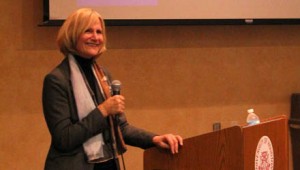Vice President of Advancement Eloise Stuhr announced to faculty and staff that the UH Alumni Association, which previously operated as an independent organization, will now be transitioning to a University-affiliated program.
Stuhr, along with President Renu Khator, said she hopes this transition will allow the UHAA to better serve graduates, students and the University.
“Moving forward, this new relationship will enable us to better serve alumni with stronger national networks and meaningful programs, including new volunteer roles and educational opportunities to enhance career placement and admissions,” Stuhr said.
“As our graduates succeed in their careers, many rise to positions that enable them to hire our talented students as interns or as salaried employees. Many other graduates serve as mentors for our students, further enhancing the ties between our current students and alumni.”
Previously, only 21 alumni associations in the country operated as independent organizations, including Texas A&M, Georgia Tech and UH, UHAA President Mike Pede said, but this collaboration will help to streamline communication and combine efficiencies.
The change will give the UHAA access to alumni data, UH offices and resources, which will help the association focus more on alumni relations such as career services, mentoring students, student recruitment and growing the UH alumni network across the U.S. It will specifically be targeting the 15 cities where more than 1,000 alumni live.
“The main goal is that we essentially engage a little over 100,000 graduates every year with our programs, and we’re trying to double that number,” Pede said. “And to do that, you have to be out of the business of just trying to make the bottom line. The long story short is we have spent 70 percent of our time generating 30 percent of our revenue.”
This transition from independent to interdependent is set to begin Sept. 1 at the end of the fiscal year. UHAA will remain a nonprofit corporation with an independent board of directors that oversee its current endowments and advise the University on alumni relations, Stuhr said.
The University will now be responsible for managing the day-to-day activities of all alumni relations programs. The current UHAA staff will become UH employees under Stuhr’s supervision in the Division of University Advancement. This will allow the UHAA to focus more on programming and less on fundraising and securing annual membership from alumni.
“Most alumni associations have a hand in student recruitment and career services and helping their alums find jobs. We don’t spend much time on that because we don’t have the time to spend,” Pede said. “This interdependence will allow us the time to spend on more relevant things to our alumni on a day-to-day basis and engage more alumni on a day-to-day basis.”
The University and the UHAA have formed eight committees that will discuss things like transitions in UHAA membership, budget and operations, constitute programming, non-membership programming and an overall plan for bettering alumni relations, said Pede said. These committees are made up of alumni, UH staff, UHAA staff and UH administrators and will prioritize new and extended programming based on the goals of the University as a whole.
“The importance of University of Houston alumni to our future success cannot be overstated. We must ensure that UH continues to play a valuable role in the lives of its former students,” Khator said. “It will create an expanded alumni base and a stronger affiliation with our former students. Ultimately, the collaboration should produce even greater pride about being a Cougar, which benefits us all.”
news@thedailycougar.com



